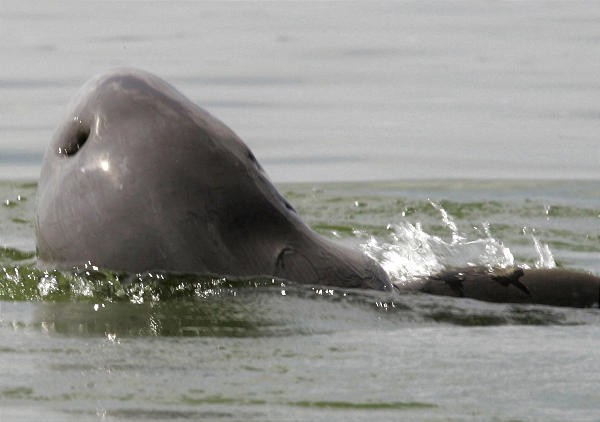Popular Reads
Top Results
Can't find what you're looking for?
View all search resultsPopular Reads
Top Results
Can't find what you're looking for?
View all search resultsMekong dam a threat to rare dolphins - and villagers too
Change text size
Gift Premium Articles
to Anyone
At least 80 Irrawaddy dolphins in the Mekong River are threatened by He Don Sahong Dam on the Laos-Cambodian border.
He Don Sahong hydroelectric dam threatens the last 80 Irrawaddy dolphins in the Mekong River - as well as the livelihoods of the people downstream in Cambodia, who depend heavily on the river’s resources.
The people in Preah Romkel village of Stung Treng province claim their way of life is in danger. The eco-tourism that boosts the local economy will be destroyed if the endangered Irrawaddy dolphins are driven into extinction by the impact of the new Don Sahong Dam on the Laos-Cambodian border. Lok Chanthou, deputy chief of Preah Romkel village, said villagers would be among the first to feel the impact of the dam. The Mekong river ecology would change and there would be no fish to catch and no dolphins to attract the tourists, she said.
"We are an eco-tourism community. Our lives depend on the river and its natural beauty. The dam construction is affecting tourism. If the dolphins die out, the tourism business will die as well," Chanthou said.
She believes local people can generate much better income from tourism since the village was developed as an eco-tourism destination on the suggestion of a local NGO. Villagers now have an income from a dolphin-watching tour, restaurants and homestays for the tourists.
Jedtra Lang, a boat pilot for the dolphin tour, said he can make an average US$20 per day but now he is worried about the future of his career.
"I am very concerned about the dam because I can see that since the dam construction started the water quality is getting poorer and many fish are dying. I am afraid that such a change will affect the dolphins around here. If they die, the tourists will not come and I will lose my job," said a worried Lang.
Chanthou argued that the ecological change to the river cannot be reversed and not only dolphins will die. People who drink the river water and eat its fish will also be hit hard by the dam, she said. "We are the victims of the dam. The dam will destroy all benefits that the river gives to us. How can anyone compensate for this loss?" she asked.
Looking out from the village, we saw the dam construction site as one of the many channels that form Si Phan Don, or the "Four Thousands Islands". This part of the Mekong River breaks away through multiple tributaries and waterfalls that make it an ideal place for a hydropower dam, but it is also the habitat of the nearly extinct Mekong River Irrawaddy dolphin.
Cambodia's director of the World Wildlife Fund, Chhith Sam Ath, said the population of Irrawaddy dolphins was fewer than 80 at the last count in December last year. The Don Sahong Dam posted a serious threat to their existence.
"The Don Sahong Dam is blocking the main fish migration passage in the Mekong River. It will result in a major fish decline, which will surely cut the food supply for dolphins. [At the same time] the rock explosions and water pollution from the dam construction harms the dolphins directly," Sam Ath said. He said that so far there were not any dolphin deaths due to the dam's impact - but if the dam continues its construction, the future of the animals was dark.
"We need to do something or these endangered dolphins will be extinct. I suggest that the dam construction has to stop as it is the primary threat to the Irrawaddy dolphins," he said.







